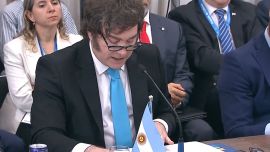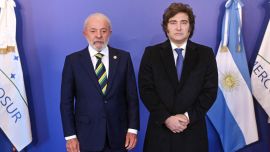Chanting and voicing their outrage, demonstrators gathered in Plaza de Mayo on Thursday evening to protest Jair Bolsonaro’s visit to Buenos Aires, as the outspoken Brazilian leader made his first trip to Argentina.
The demonstration, entitled “Argentina Rejects Bolsonaro” and dominated by leftist groups, saw many protesters chant slogans which grouped together Bolsonaro, President Mauricio Macri and US President Donald Trump as propagators of hate.
Malena, an activist with the political youth organisation La Simón Bolívar, told the Times that “Bolsonaro is for us the most clear face of xenophobia, homophobia, machismo, neoliberalism and repression and it is important to get out and show that we reject this.”
The crowd, which was made up of a wide range of ages, was attended by both Argentines and Brazilians. The march included representatives from over 60 leftist organisations and political groups, including Movimiento Socialista de los Trabajadores (MST), Izquierda Socialista, Movimiento Territorial Liberación and Polo Obrero, though participants with no ostensible affiliation could also be seen.
Protesters covered Avenida De Mayo in a sea of mostly red-and-white flags – an occasional rainbow pride flag could also be glimpsed – as they marched toward the Plaza de Mayo at around 6.30pm local time. Hundreds gathered around a stage constructed out of a storage container placed on a truck, while dozens of street vendors sold beer and hamburgers, in what was perhaps the only explicit display of support for capitalism.
Soon, a series of speakers and musicians took to the stage, leading chants such as “Out with Bolsonaro! Out with Macri!” or “Racist! Racist! Racist!” Several of the speakers were Brazilian and lead songs in Portuguese.
“Lula libre” was another common refrain heard throughout the event — a call for the freedom former Brazilian president Luiz Inácio Lula da Silva, currently serving 12 years in prison for corruption — and many took the gathering as an opportunity to promote other “anti-fascist” causes such as the liberation of Palestine. Other protesters took aim at the powerful Grupo Clarín media group, evangelical Christians and the International Monetary Fund (IMF).
Support
Bolsonaro was in Buenos Aires for a state visit dominated by discussion on Venezuela, the long-trailed Mercosur-EU trade deal. Reports also emerged that the two presidents discussed another long-held goal, the creation of a common currency which would be called the “Peso Real.”
The Brazilian leader also lent support to Macri’s re-election efforts saying that Brazil and Argentina had to leave behind the “corruption of the pass” represented by Lula and the Kirchnerite administrations.
“We want the Argentine community to choose a centre-right candidate,” he said. “Just like Brazil, and also Paraguay, Chile, Peru and Colombia have done.”
In their meeting, there was no indication that President Macri supported the march’s sentiment that “Bolsonaro’s hate is not welcome in Argentina.” Bolsonaro characterised Brazil and Argentina as “brothers” in making progress in Latin America and the two posed laughing as the Cambiemos leader sported a Brazilian football hat.
The apparent link between the two leaders was underlined by the protesters on Thursday. Though only Bolsonaro was depicted as Hitler, with swastikas surrounding him on many posters, much of the rhetoric and signage at the demonstration sought to paint the leaders as two sides of the same coin.
“Macri is included because he responds directly to international markets,” said Malena, the activist with La Simón Bolívar organisation. “He responds directly to what Trump needs. Thus Trump is an ally that Macri needs in government at this moment to ensure his interference with and control of Argentina.”
Triumph and defeat
While Bolsonaro spoke of Latin American unity between countries such as Brazil, Argentina, and opposition forces in Venezuela, speakers at the rally offered their own interpretation of unity: between Latin American leftists and workers.
Senator Federico 'Pino' Solanas (Proyecto Sur-Buenos Aires City), spoke of the need for a Latin American “patriotic front” to defeat the right, neoliberalism and Donald Trump – and win October’s upcoming election.
“To triumph in Argentina [in the October elections], is to also defeat Bolsonaro,” he said. “In this way we will open up an alliance with other countries that are resisting in Latin America like in Bolivia, like in Uruguay, like in Venezuela, like in the Mexico of Andrés [Manuel] López Obrador.”
MST presidential hopeful Cele Fierro, whose party led a demonstration outside the Brazilian Embassy prior to the rally, told the Times that it is necessary to demonstrate the existence of a broad front Latin American unity against Bolsonaro’s form of governance.
“We want to build a relationship of solidarity between workers,” she said. “Before Bolsonaro became president, when the first demonstrations by EleNão [the movement that organised protests of hundreds of thousands of people against Bolsonaro before he became president] were happening, we replicated them here in Argentina. When there were demonstrations in the United States against the election of Donald we also replicated them here in Argentina.”
With over 60 different organisations present at the demonstration, Fierro also hailed the unity between various leftist groups.
“We are distinct organisations, that much is clear, but today in the streets we find ourselves all together fighting, condemning this visit,” she said.
According to Alex, an activist with the Movimiento Territorial de Liberación, the differences between the manifold groups are not important.
“First of all, everyone is fighting against the government. That is the main reason we are all here,” he said. “The idea is to pressure the government to stop abusing the people.”





















Comments